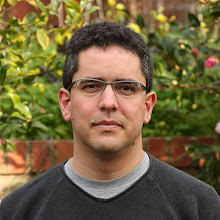(click on the speaker name or photo to view speaker details)

Director of Optimization and Analytics, AppNexus
As Director of Optimization and Analytics, Dave Himrod manages a team of analysts, quants, and engineers devoted to crafting world-class algorithms. When Dave joined in 2009, he managed AppNexus' first account, eBay. While building AppNexus' original optimization algorithm, Dave was heavily involved in building out the data-pipeline and defining the data model still in use today. He has since grown his team to more than 20 people and focuses his time on building a world-class scalable optimization system. He and his team continue to improve the tools for optimized pricing and budgeting for the over 27 billion ad impressions their platform sees per day. Dave has a Bachelor¹s Degree in Computer Science from University of Pennsylvania.

Fernando Pérez received his PhD in theoretical physics from the University of Colorado and did his post-doctoral work there in applied mathematics, working on fast algorithms for partial differential equations. He is currently a research scientist at UC Berkeley’s Helen Wills Neuroscience Institute, focusing on the development of new analysis methods for brain imaging problems and high-level scientific computing tools.
Towards the end of his graduate studies, he became involved with the development of Python tools for scientific computing. He started the open source IPython project in 2001 when he needed an efficient interactive workflow for everyday scientific tasks. He continues to lead IPython, as part of a growing team of talented developers.
He remains committed to the development of open, high-level tools to tackle the current challenges in computationally-based scientific research and education across disciplines. He is a member of the matplotlib development team and has contributed to numpy, scipy, sympy, mayavi, nipy and nitime. He regularly organizes workshops and lectures aimed at teaching the use of these tools to audiences at levels ranging from high-school students to research scientists. He is also a member of the Python Software Foundation.
When not glued to a computer, Fernando tries to spend as much time as possible with his wife outdoors hiking and backpacking, as well as climbing. For more information, see http://fperez.org.
Krishna Sankar is currently a Principal Architect/Data Scientist with the NextGen Big Data group at Tata Consultancy Services. Prior to this he was Director of Engg/Data Science at Genophen, working on bioinformatics/consumer applications in AWS. He also has worked at Egnyte as a Lead Architect, developing cloud object store layer (handling billions of files/petabytes of storage) and security (federated Identity/SSO); and before that he was at Cisco as a Distinguished Engineer, lastly working on various aspects of "Big Data and Cloud Computing":http://doubleclix.wordpress.com/about/.
Krishna’s recent speaking engagements include OSCON 2012 Social Media Analysis with Twitter[http://goo.gl/mFflw], OSCON 2011 – Hitchhiker’s Guide to Kaggle[http://goo.gl/75X7w] & OSCON 2010 [http://goo.gl/8Ukiw] as well as guest lecturing at the Naval Postgraduate School on Big data [http://goo.gl/2pBYS]. His interests include big data stacks – from infrastructure to visualization, highly scalable cloud architectures & intelligent inferences. In his spare time, he is pursuing the Mining Massive Data Sets Graduate Certificate at Stanford. He also writes books – including “Cisco Wireless LAN Security” and “Enterprise Web 2.0”. His other passion is Lego Robotics and is contributing as Technical Judge in local & Lego world competitions.
Engineering Manager, Optimization and Analytics, AppNexus
As Engineering Manager for Optimization and Analytics, Steve manages software development for AppNexus's best-in-class systems for ad transaction optimization. Since joining AppNexus in 2010, Steve has led the design of distributed systems for scalable computation and data processing and set the technical standards for a team of engineers while iterating on the optimization feature set. Previously, Steve was a software developer at Google working on Google Places for Business and Local Search Quality. Steve has a Master's of Engineering in Electrical Engineering and Computer Science and a Bachelor's Degree in Computer Science from MIT.

CEO and Co-Founder, Continuum Analytics Introduction to NumPy; Introduction to SciPy
Dr. Oliphant has a Ph.D. in Biomedical Engineering from the Mayo Clinic, and M.S. and B.S. degrees in Electrical Engineering (and Math) from Brigham Young University. Travis has worked extensively with Python for numerical and scientific programming since 1997, and was the primary developer of the NumPy package and the author of the definitive Guide to NumPy. He is also the primary founding author of the SciPy package. During his academic career, he has worked in the fields of satellite remote sensing, Magnetic Resonance Imaging (MRI), Ultrasound, elastography, and general inverse problems. He was an Assistant Professor of Electrical and Computer Engineering at Brigham Young University from 2001 to 2007 where he taught courses in probability theory, electromagnetics, inverse problems, and signal processing. In addition, he directed the BYU Biomedical Imaging Lab, and performed research on scanning impedance imaging. He has done consulting work since 1997 in laser scattering off of semiconductors, sparse matrix calculations for search engines, and mesh transformations for fluid dynamics. Dr. Oliphant co-founded Continuum Analytics, Inc. in 2012 and currently serves as its CEO.